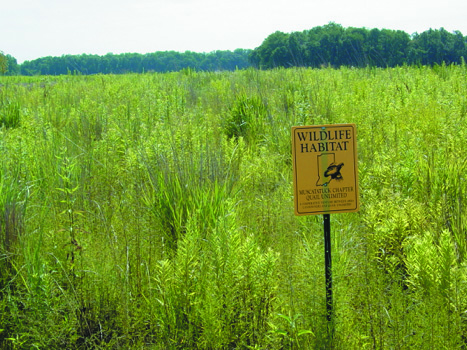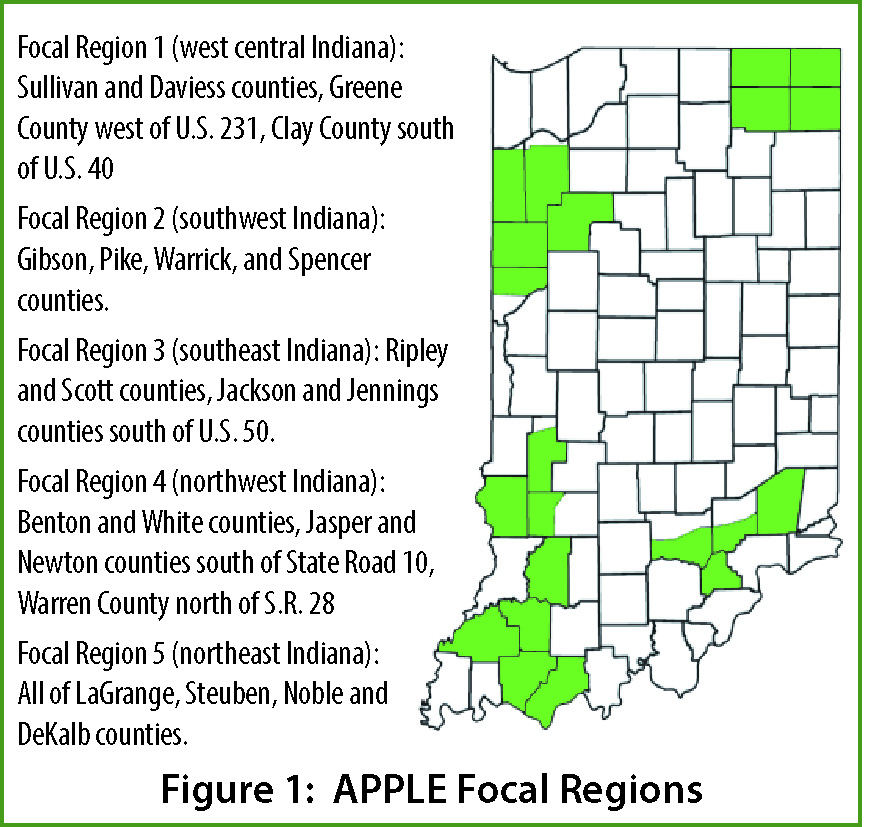APPLE – Not Just a Fruit Anymore
Fall in Indiana brings many anticipated things—cooler weather, beautiful scenery filled with bright tree leaves, and, best of all, gamebird hunting. Gamebird hunting remains one of Indiana sportsmen’s and women’s most anticipated adventures. Northern bobwhite quail, ring-necked pheasant, and American woodcock are some of the most prized gamebirds in the United States, and they all call Indiana home. However, due to the loss of grasslands in Indiana, these birds are becoming hard to find. Finding locations that provide opportunities to hunt these prized gamebirds can be even harder.
The DNR Division of Fish & Wildlife offers a new program called Access Program Providing Land Enhancements (or APPLE) to help increase gamebird hunting access. APPLE provides hunting-access opportunities for Northern bobwhite quail, ring-necked pheasant, and American woodcock across five focal regions throughout Indiana (Figure 1). The five focal regions were strategically selected based on areas that have both the greatest need for grassland and pollinator habitats, and the most potential for improvement of grassland habitats and populations of bird species that depend upon them.
Gamebird hunting opportunities are limited and in high demand in Indiana. For example, in 2015, 3,444 individuals applied for special pheasant reserved draw hunts on DNR managed lands in northwest Indiana; however, only 333 hunting opportunities existed for hunters. That equates to a 9.7 percent chance of being selected. Gaining access to private land to hunt gamebirds is often just as difficult.
The APPLE program uses monies collected from the sale of the Indiana Gamebird Habitat Stamp, which hunters must purchase to legally pursue gamebirds in Indiana. Gamebird Habitat Stamp money is then used to provide landowners incentive payments to maintain gamebird habitat and allow access for limited-use gamebird hunting on their property. Ideally, landowners will work with a wildlife biologist to develop a management plan as well as obtain financial assistance to create or enhance habitat on their property. Landowners will then have the ability to enroll some or all of those acres into APPLE for additional funding after the habitat has been created. For landowners who already possess lands with quality gamebird habitat, enrollment in APPLE may be possible before or as further habitat maintenance occurs.
The incentive payments for landowners wanting to enroll property in APPLE ranges from $8 an acre to $25 an acre. Properties intensively managed for gamebirds will receive the higher payment. Biologists will work with landowners to decide hunt dates, designated parking locations, hunter numbers, what portions of the property will be hunted, and any other specifications landowners may have for the property. Liability for all activities on APPLE tracts of land is covered under the state of Indiana Agro-tourism Law (IC 34-31-9). Participating landowners can still hunt and lease their land for species other than those targeted by APPLE. For target species, landowners must forego hunting until after the last reserved hunt date has passed. The minimum acreage size to enroll is 20 acres. Each area enrolled in APPLE will be easily identifiable and posted with an APPLE sign at the designated parking location.
Access to APPLE properties is reserved solely for successfully drawn participants and their hunting partners (up to two) during the specified APPLE hunt dates. Hunters will use the reserve hunt system to apply. All participating hunters must sign a liability waiver before participating in the APPLE hunt, follow all laws and APPLE regulations, and obtain all necessary permits and licenses. All hunters will be restricted to foot traffic only. Hunting hours will be from 9 a.m. – 3 p.m. ET on APPLE hunt dates. 
Private lands are important resources for wildlife populations. Since Indiana’s land is 96% privately owned, it is private landowners like you who can positively affect gamebird species and help preserve our hunting heritage. If you are interested in learning more about improving wildlife habitat on your property through the APPLE program please contact Jason Wade, North Region Landscape Biologist or Erin Basiger, South Region Landscape Biologist. More information can be found at wildlife.IN.gov/9572.htm.
